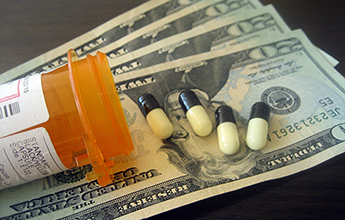
Why the TPP Would Raise
|
 |
| Provisions in the Trans-Pacific Partnership could raise the cost of prescription drugs. Photo used under a Creative Commons License from Flickr user Images Money |
The AFL-CIO, the AARP and eight other organizations recently sent a letter to U.S. Trade Representative Michael Froman expressing their concern over provisions in the TPP could end up jacking up prescription drug prices.
Center on Budget and Policy Priorities Senior Fellow Paul N. Van de Water writes:
The draft TPP would restrict Medicare’s ability to limit the prices it pays for drugs for [Medicaid] Part B beneficiaries … The TPP could allow drug companies to challenge existing Part B payment policies that hold down costs and foreclose some future cost-containment steps, such as discouraging the use of new drugs that are costlier but no more effective than existing alternatives.
The IBEW and the labor movement have been vocally opposed to the proposed agreement, joining with consumer activists and pro-worker lawmakers May 7 protesting “fast-track” legislation that would give President Obama authority to approve the TPP without a Congressional vote.
"Forcing Congress to vote on an agreement this big and complex without knowing any of the details is bad for democracy and bad for the economy," said IBEW International President Edwin D. Hill.
Language in the TPP would also drive up costs by expanding patent protections on drugs, making it harder for companies to produce cheaper, generic versions.
Thirdly, the TPP gives pharmaceutical companies the ability to sue federal and state authorities over pricing policies designed to reduce health care costs.
As Van de Water writes:
Under a similar provision of the North American Free Trade Agreement, for example, the drug company Eli Lilly is suing the Government of Canada for $500 million because Canadian courts invalidated patents for two drugs that didn’t meet Canada’s legal standards.
Click here to read the letter.
And click here to read more about the TPP from the Electrical Worker.
![]()